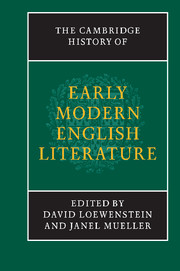Book contents
- Frontmatter
- Introduction
- 1 Modes and means of literary production, circulation and reception
- 2 The Tudor era from the Reformation to Elizabeth I
- 3 The era of Elizabeth and James VI
- 10 Literature and national identity
- 11 Literature and the court
- 12 Literature and the church
- 13 Literature and London
- 14 Literature and the theatre
- 4 The earlier Stuart era
- 5 The Civil War and Commonwealth era
- Chronological outline of historical events and texts in Britain, 1528–1674, with list of selected manuscripts
- Select bibliography (primary and secondary sources)
- Index
- References
10 - Literature and national identity
from 3 - The era of Elizabeth and James VI
Published online by Cambridge University Press: 28 March 2008
- Frontmatter
- Introduction
- 1 Modes and means of literary production, circulation and reception
- 2 The Tudor era from the Reformation to Elizabeth I
- 3 The era of Elizabeth and James VI
- 10 Literature and national identity
- 11 Literature and the court
- 12 Literature and the church
- 13 Literature and London
- 14 Literature and the theatre
- 4 The earlier Stuart era
- 5 The Civil War and Commonwealth era
- Chronological outline of historical events and texts in Britain, 1528–1674, with list of selected manuscripts
- Select bibliography (primary and secondary sources)
- Index
- References
Summary
To describe Scottish, English, Irish or Welsh national discourses in the latter half of the sixteenth century as discrete intellectual traditions would credit unduly the propaganda of nationhood itself, and grant the claim of national autonomy to a moment when national identities were even more interdependent than they would become. Such interdependence is perhaps especially true for members of the British archipelago (both then and now). It is not that the concept of an independent Scotland or England does not exist in this period. (Ireland and Wales are largely beyond the pale of national self-representations at this time–at least in the English language – though they did indeed have identities within an imperial British state thrust upon them.) But the identities of these British nations are developed in relation to each other, both discursively and politically. Their representations are further interwoven both by virtue of their authors’ membership in a common cultural milieu, and especially by virtue of the fact that the two countries define themselves first and foremost as an effect of Protestantism, and in relation to its enemies. When Henry VIII declared in 1533 that ‘this realm of England is an empire…without restraint or provocation to any foreign princes or potentates of the world’, he struck a rhetorical alliance of Protestantism and resistance to alien domination which would circulate throughout the Tudor century, sometimes in ways uncongenial to monarchy.
- Type
- Chapter
- Information
- The Cambridge History of Early Modern English Literature , pp. 311 - 342Publisher: Cambridge University PressPrint publication year: 2003
References
- 1
- Cited by



